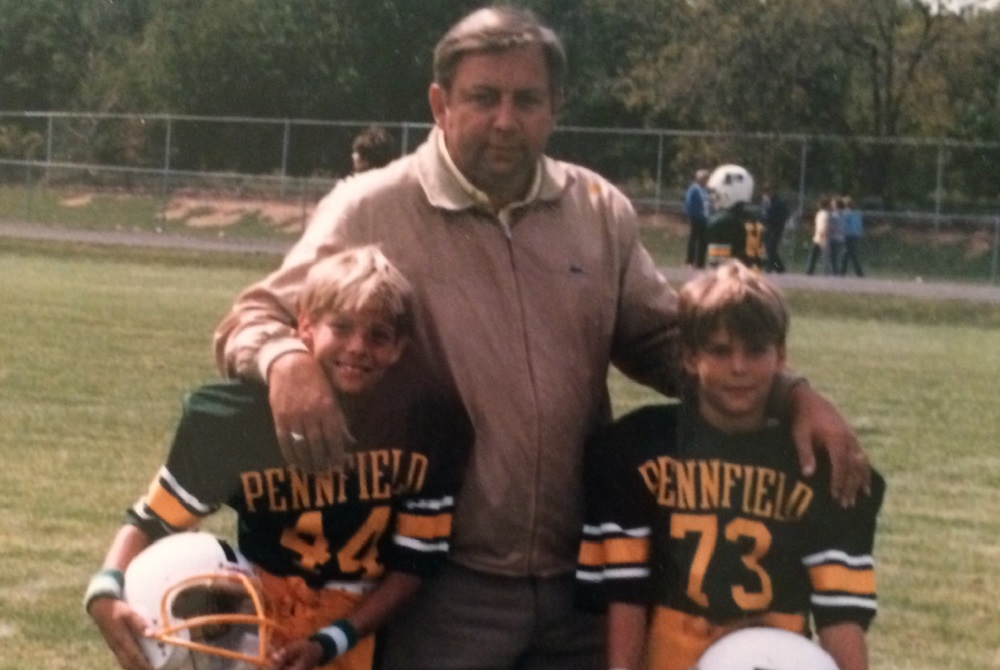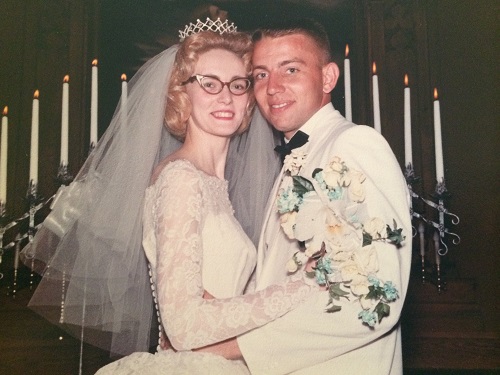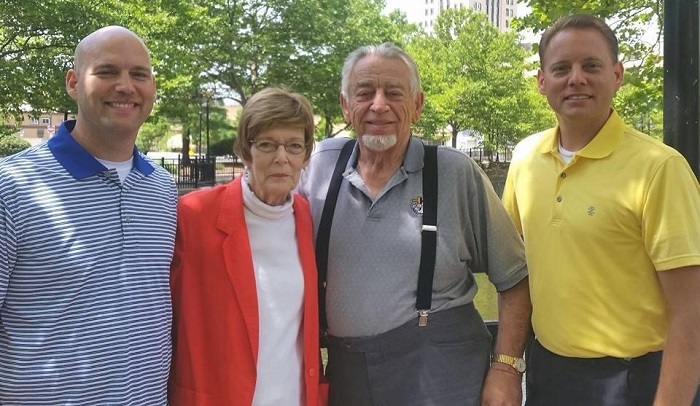
'Larger-Than-Life' Pennfield AD Admired for Statewide Service
By
Pam Shebest
Special for MHSAA.com
April 14, 2021
BATTLE CREEK — To many Battle Creek sports enthusiasts, Bernie Larson was known as “Mr. Pennfield.”
 But for two former athletes, twins Chris and Cam Larson, that was not the case.
But for two former athletes, twins Chris and Cam Larson, that was not the case.
“I never knew him or thought of him as Mr. Pennfield; he was Dad,” Chris said.
Larson, 78, who served as athletic director at Pennfield for 29 years, died March 14 after an extended illness.
A memorial service is being planned for May 15 at a time and place to be determined.
“A lot more remembrances come back when someone passes,” said Chris Larson, who lives in Virginia. “You hear so many stories from people who remember him, including former students and coaches.
“It’s great to hear the impact he had on so many people that you never knew about.”
Stories are plentiful when it comes to Bernie Larson.
“He was a heckuva golfer,” said Karen Leinaar, the current executive director of the Michigan Interscholastic Athletic Administrators Association (MIAAA) who during an early stop served as athletic director at Delton Kellogg, which with Pennfield for a time was part of the Kalamazoo Valley Association. “If you needed golf balls on the course, everyone said, ‘Just ask Bernie.’ He always had them.”
The reason?
“If he had one ball in his bag, he had 50 or 60 in his bag,” said Larry Wegener, former Battle Creek Central athletic director. “He had milk crates full of golf balls in his garage” that he found on the course or fished out of ponds.
Championship City
When Larson was named Pennfield’s athletic director in 1970, it became a family affair.
“I had no clue, no clue,” said Joni, Larson’s wife of 56 years. “We never trained to be wives of athletic directors. We learned the most from other wives.”
 She became involved in the job, selling tickets at home games. When their sons were old enough, they helped out with the field.
She became involved in the job, selling tickets at home games. When their sons were old enough, they helped out with the field.
“They knew where the flag was kept and how to play the national anthem. They learned how to keep score” and were active in playing sports, she recalled.
“Cam (who lives in Minnesota) played football, baseball and basketball,” Chris Larson said. “I played tennis, golf and basketball. We grew up playing little league baseball and football.”
One family favorite was the yearly athletic directors conference at Grand Traverse Resort.
“He was there for business; we kids were there for fun,” his son said. “As we got older, we went to the auditorium that was filled with booths with sports-related things.
“As a kid we went around and grabbed the swag. It was a kids of athletic directors thing.”
It was not all fun and games.
“Bernie Larson was instrumental putting Battle Creek on the map athletically,” Leinaar said. “Four of (the ADs), Bernie, Ralph Kenyon of Harper Creek, Glen Schulz of Lakeview and Larry Wegener of Central put on the tournaments and had crews of people every year right there helping.
“Their hard work and commitment to the MHSAA, running perfect tournaments, made Battle Creek a stop for athletics for many, many years. Many times, Bernie led the pack.”
In spite of his willingness to help others, there was a caveat, Leinaar said.
“He would say to me, ‘Karen, I’ll help you out however I can, but remember, Pennfield is going to win.’
“Pennfield joined the KVA in the late 1980s, so we saw each other quite a bit. Our football games were always barn burners as were track and field.”
 Wegener recalls those days full of tournaments and 65-hour work weeks.
Wegener recalls those days full of tournaments and 65-hour work weeks.
“We did so many MHSAA events, I think a lot of people thought we were on the staff,” he said.
Those tournaments included more than 50 state championships in baseball and softball, team and individual wrestling, volleyball and girls basketball.
Brett Steele, Pennfield’s current AD, said Larson “was still a strong presence in the athletic department and community as a whole even after he retired.
“Up until last winter, Bernie still helped out at football and basketball games as our officials host. He knew most of the officials in those sports and was a familiar face to many when they worked games at Pennfield.”
Larson had served as an MHSAA basketball and baseball official. He also helped found and is a member of the Pennfield Hall of Fame and coached both girls and boys golf.
He received the MHSAA’s Allen W. Bush Award in 1997, the MHSAA’s Charles Forsythe Award in 1999 and was the MIAAA State Athletic Director of the Year for 1991-92.
All About Family
In spite of the hours spent with his job, Larson was a good family man, Wegener said.
“He spoke highly of his kids,” he said. “Chris and Cam were the pride of his life. Joni was a real good fit for him.”
Wegener said Larson was a larger-than-life guy.
“If you were going to run a tournament and you brought a notebook full of stuff for your tournament, Bernie brought a briefcase.
“If you brought a briefcase, Bernie brought a suitcase. He just believed in being prepared for everything.”
One thing the athletic directors did a lot was frequent restaurants, and Larson had his favorites.
“Perkins whenever he traveled, the Pancake House every Sunday and the Irish Pub,” Chris Larson said.
A person could always spot Larson. He was with one with the napkin tucked over his shirt.
“He always wore a suit and tie and would use a napkin as a bib because he was always spilling something on his necktie,” Joni Larson said.
Another thing her husband was famous for was his jokes.
“He always had a favorite joke that I’d hear 27 times,” she said, laughing. “It was like he had a joke of the week, and everybody had to hear it.”
During summers, Larson taught driver’s education at the school, something Chris Larson remembers well.
 “I remember on the last day of driver’s ed, you drove for 45 minutes,” he said. “My brother and I and one other kid were in the car, and I drove to Lansing to the MHSAA and we sat in the parking lot while my dad went inside.
“I remember on the last day of driver’s ed, you drove for 45 minutes,” he said. “My brother and I and one other kid were in the car, and I drove to Lansing to the MHSAA and we sat in the parking lot while my dad went inside.
“I know the MHSAA through his eyes and through my own eyes.”
Larson’s love of sports transferred to his sons.
“We all share a love of golf and would play together any chance we got, but over the past years his health wouldn't allow him to play,” Chris Larson said. “I miss that very much.”
Another tradition is being carried on by his son, but it evolved in an unusual way.
The twins were a Christmas surprise for Bernie and Joni.
“They didn’t do ultrasounds routinely back then (1974) so we didn’t know,” Joni Larson said. “We had Bernie’s middle name, Leon, picked out as a first name,” Joni Larson said.
“When we found out there were twins, we gave Chris ‘Leon’ as his middle name and Cameron ‘Noel’ which is Leon backwards, so both had dad’s middle name.”
Chris Larson has continued the tradition, giving his oldest son, Joshua, Leon as a middle name.
Chris Larson echoed the thoughts of many who knew Mr. Pennfield as a people person.
“In my opinion, he was the most Christian man I knew. He lived a Christian life and he shared it with others,” Chris said.
“He was chaplain for some baseball and basketball teams. He knew somebody everywhere no matter where we went in the state.”
Chris Larson paid a special tribute to his father after the funeral.
“He had a parking spot in the circle of the old Pennfield High School right in front of his office,” he said. “His van was there all the time.
“One of the things I did after the funeral was just hang out there for a while.”
 Pam Shebest served as a sportswriter at the Kalamazoo Gazette from 1985-2009 after 11 years part-time with the Gazette while teaching French and English at White Pigeon High School. She can be reached at [email protected] with story ideas for Calhoun, Kalamazoo and Van Buren counties.
Pam Shebest served as a sportswriter at the Kalamazoo Gazette from 1985-2009 after 11 years part-time with the Gazette while teaching French and English at White Pigeon High School. She can be reached at [email protected] with story ideas for Calhoun, Kalamazoo and Van Buren counties.
PHOTOS: (Top) Longtime Pennfield athletic director Bernie Larson also raised his family in the district, with sons Chris (left) and Cam among those to wear the uniform. (2) Bernie and Joni Larson were married 56 years. (3) Among Larson’s longtime colleagues were former Delton Kellogg athletic director Karen Leinaar and retired Battle Creek Central athletic director Larry Wegener. (4) The Larson family, more recently, from left: Cam, Joni, Bernie and Chris. (Family photos courtesy of the Larson family; head shots by Pam Shebest.)

High School a Time for Plays of All Kinds
April 2, 2015
By Jack Roberts
MHSAA executive director
At end of season or school year banquets attended by student-athletes and their parents, I often tell this short story about my mother that never fails to get a good laugh, especially from mothers:
“At the end of my junior year of high school I attended the graduation ceremony for the senior class on a hot and humid early June evening in our stuffy high school gymnasium. The bleachers on each side were filled to capacity, as were several hundred folding chairs placed on the gymnasium floor.
“The public address system, which was wonderful for announcing at basketball games or wrestling meets, was awful for graduation speeches. Person after person spoke, and the huge audience wondered what they had to say.
“I was present because I was the junior class president; and as part of the ceremony, the senior class president handed me a small shovel. It had something to do with accepting responsibility or carrying on tradition.
“In any event, the senior class president spoke briefly; and then it was my turn. I stepped to the podium, pushed the microphone to the side, and spoke in a voice that was heard and understood in every corner of the gymnasium.
“Whereupon my mother, sitting in one of the folding chairs, positioned right in front of my basketball coach – who had benched me for staying out too late on the night before a game, because I had to attend a required school play rehearsal – my mother turned around, pointed her finger at the coach and said, ‘See there? That’s what he learned at play practice!’
“And she was heard in every corner of the gymnasium too.
“But my mother knew – she just knew – that for me, play practice was as important as basketball practice. And she was absolutely correct.”
This old but true story about in-season demands of school sports actually raises two of the key issues of the debate about out-of-season coaching rules.
One is that we are not talking only about sports. School policies should not only protect and promote opportunities for students to participate in more than one sport; they should also allow for opportunities for students to participate in the non-athletic activities that comprehensive, full-service schools provide.
This is because surveys consistently link student achievement in school as well as success in later life with participation in both the athletic and non-athletic activities of schools. Proper policies permit students time to study, time to practice and play sports and time to be engaged in other school activities that provide opportunities to learn and grow as human beings.
A second issue the story presents is that parents have opinions about what is best for their children. In fact, they feel even more entitled to express those opinions today than my mother did almost 50 years ago. In fact, today, parents believe they are uniquely entitled to make the decisions that affect their children. And often they take the attitude that everyone else should butt out of their business!
The MHSAA knows from direct experience that while school administrators want tighter controls on what coaches and students do out of season, and that most student-athletes and coaches will at least tolerate the imposed limits, parents will be highly and emotionally critical of rules that interfere with how they raise their children.
No matter the cost in time or money to join elite teams, take private lessons, travel to far-away practices and further-away tournaments, no matter how unlikely any of this provides the college athletic scholarship return on investment that parents foolishly pursue, those parents believe they have every right to raise their own children their own way and that it’s not the MHSAA’s business to interfere.
It is for this very reason that MHSAA rules have little to say about what students can and can’t do out of season. Instead, the rules advise member schools and their employees what schools themselves have agreed should be the limits. The rules do this to promote competitive balance. They do this in order to avoid never-ending escalating expense of time and money to keep up on the competitive playing field, court, pool, etc.
Every example we have of organized competitive sports is that, in the absence of limits, some people push the boundaries as far as they can for their advantage, which forces other people to go beyond what they believe is right in order to keep up.
If, during the discussions on out-of-season rules, someone suggests that certain policies be eliminated, thinking people will pause to ask what life would be like without those rules.
Our outcome cannot be mere elimination of regulation, which invites chaos; the objective must be shaping a different future.
A good start would be simpler, more understandable and enforceable rules. A bad ending would be if it forces more student-athletes and school coaches to focus on a single sport year-round.

